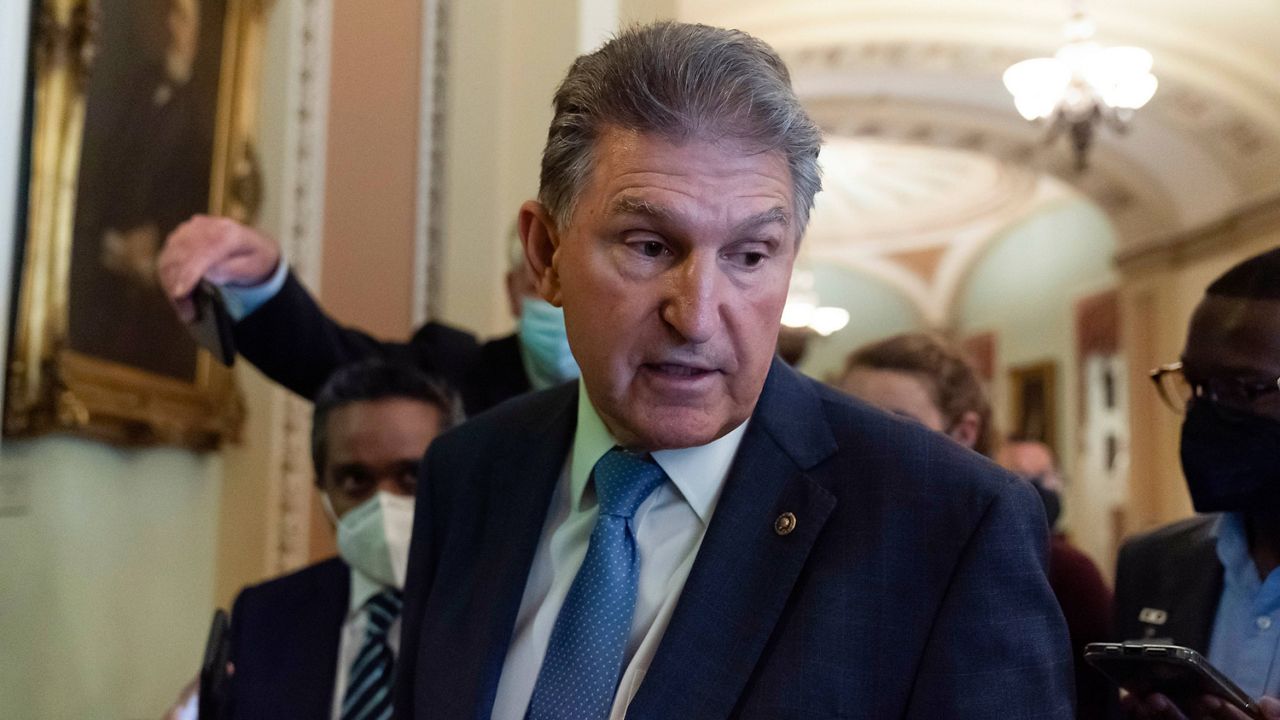Sen. Joe Manchin, D-W.Va., is accusing the Biden administration of subverting the Inflation Reduction Act while it pursues a partisan agenda.
What You Need To Know
- Sen. Joe Manchin, D-W.Va., is accusing the Biden administration of subverting the Inflation Reduction Act while it pursues a partisan agenda
- Manchin made the allegation in an op-ed published Wednesday evening on The Wall Street Journal’s website, in which the centrist Democrat also sided with Republicans in urging President Joe Biden to engage in talks to raise the national debt limit
- Manchin was key in negotiating the Inflation Reduction Act, a sweeping tax, climate and health care law Congress passed last summer
- The West Virginia senator wrote that despite the law’s explicit direction to pay down the debt, “the administration seems more determined than ever to pervert that law and abuse existing authorities to increase spending"
Manchin made the allegation in an op-ed published Wednesday evening on The Wall Street Journal’s website, in which the centrist Democrat also sided with Republicans in urging President Joe Biden to engage in talks to raise the national debt limit.
Manchin was key in negotiating the Inflation Reduction Act, a sweeping tax, climate and health care law Congress passed last summer.
The West Virginia senator wrote that despite the law’s explicit direction to pay down the debt, “the administration seems more determined than ever to pervert that law and abuse existing authorities to increase spending.”
Manchin said that before Congress passed the bill, he and Biden agreed the legislation was designed to reduce the debt and shore up domestic energy security by generating new revenue.
“Yet instead of implementing the law as intended, unelected ideologues, bureaucrats and appointees seem determined to violate and subvert the law to advance a partisan agenda that ignores both energy and fiscal security,” Manchin wrote in the op-ed.
He accused the Biden administration of ignoring the law’s intent to support and expand fossil energy and redefining “domestic energy” to increase clean-energy spending “to potentially deficit-breaking levels.”
“The administration is attempting at every turn to implement the bill it wanted, not the bill Congress actually passed,” Manchin wrote.
A White House official said in a statement to Spectrum News on Thursday: “We have a strong and productive relationship with Senator Manchin. We are proud of the Inflation Reduction Act and our shared goals it achieves—promoting America’s energy security, strengthening supply chains, creating good-paying manufacturing jobs, and investing in energy communities and towns across America that have been left behind.”
Saying the only person who can rein in “this extremism” is Biden, Machin called for the president to meet with fiscally minded Republicans and Democrats to negotiate “common-sense reforms to out-of-control fiscal policy.”
“While we can all acknowledge that raising the debt limit is an absolute necessity and Republicans shouldn’t threaten otherwise, are we seriously to believe there is no room to negotiate?” Manchin wrote. “Does the federal government operate so efficiently and effectively that there truly isn’t a dollar of waste, fraud or abuse? Let’s get serious.”
Manchin also said Biden should instruct his administration to implement the Inflation Reduction Act as intended and stop redefining its tax credits and other subsidies.
“Unless common-sense actions are taken now, America’s energy security will not only be jeopardized, but we will soon approach a debt-ceiling calamity that is completely avoidable,” he wrote. “What we must avoid is the typical Washington game in which Democrats attack Republicans and Republicans respond in kind. The American people are sick and tired of these games—and they should be.”
Republicans, led by House Speaker Kevin McCarthy, have demanded Biden negotiate with them to raise the debt ceiling. They are seeking spending cuts.
Biden says Congress should raise the debt limit without conditions, as it did three times during the Trump administration and dozens of other times under previous presidents.
The debt limit is the amount of money the U.S. government is authorized to borrow to pay its existing legal obligations. The Treasury Department began in January using “extraordinary measures” so the government can pay its debts, and Treasury Secretary Janet Yellen has warned lawmakers that if they don’t act, the country will run out of money to pay its bills sometime in June.
If Congress fails to raise or suspend the debt ceiling, the U.S. would default on its loans for the first time in its history, resulting in social security, military pay and other checks not being written and the government and Americans being hit with higher interest rates. A U.S. debt default also could potentially trigger a recession, experts say.
The national debt currently sits at $31.4 trillion. Earlier this month, Biden unveiled his $6.8 trillion budget proposal that aims to cut deficits by nearly $3 trillion over 10 years.



